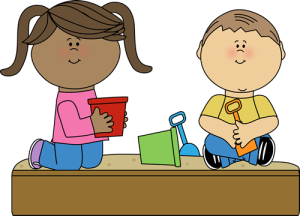Training Kids to Rule the Playground
I sat sunning myself on the park bench watching her almost-five-year-old self scoop and sift sand through her fingers while eyeing the boy across the sandbox digging holes with his long-handled shovel. She offered small talk but he’d have none of it and pushed his shovel deeper into the sand as though flexing his muscles to impress her.
Amused by their interplay, wondering how it might end, I kept a watchful eye.
More impressed with his shovel than his underdeveloped biceps, she asked if she might have a turn digging holes with the coveted tool. Still speechless, he shook his head, “no” and she frowned, crossing her hands across her chest. Silence polluted the air between them and sent him running to his mother’s side, leaving the long-handled shovel behind.
I held my breath…
Sure enough she seized the opportunity, grabbed that shovel and dug in deep.
…and I watched.
Like a silent picture show, I watched as he returned to the sandbox, held out his hand and demanded she return his shovel. She feigned deafness and dug her heels (and his shovel) deeper into the sand. He stood resolute and determined – hand still extended.
I eyed his mother sitting opposite me on her own park bench. She was just as attentive, yet content to let these kids govern by their own rules.
My younger, less experienced self would have hurdled teeter totters to set things right and teach them both a lesson in sharing and fairness. But after a few laps around this playground called Life, I’ve learned that children have their own set of playground rules written in their hearts and they govern themselves quite well without adult supervision.
The sandbox adventure continued for a few more minutes and just about the time when my old-self kicked in, she politely handed the boy his shovel. I sat back down and she went back to cupping sand by hand. He dug a bit, but within seconds, offered up his shovel. She smiled up at him and they busily worked side-by-side until the issue was far behind them.
Soon, they left the sandbox and the shovel behind to tackle more important projects like balancing teeter totters and climbing across monkey bars. And when they asked for help, the boy’s mother and I gladly offered our assistance.
While not all situations resolve themselves without parental/adult input, I do believe we are all born with a conscience – that innate sense of right and wrong. The earliest Bible stories tell us this and also prove that left on our own, we’re selfish beings. We want what we want when we want it, right? Just like children. But when we get it, whether by fair or foul play, our conscience rattles our monkey bars.
A well-groomed conscience – one that’s been trained to live by God’s commandments (Love the Lord your God with all your heart and love your neighbor as yourself) will choose to live by the unspoken playground rules.
A sloppy conscience – one that lives ignorant to God’s commandments – still understands right from wrong, but makes the more self-gratifying choices, disregarding his opponents feelings or desires.
How do we raise children with a well-groomed conscience?
1. Be their best example by following God’s greatest commandments: Love God/Love your neighbor as yourself. Be a positive influencer and surround yourself and your child with positive influencers. Pay attention to your actions and the actions of those with whom you choose to spend your time.
2. Start at birth teaching right from wrong. This starts with learning your child’s personality and reasons for crying from the time they’re born. An infant quickly learns how to wrap a parent around their finger through cries and coos. For example, when an infant has been sufficiently fed, changed and loved and cries every time you lay them down, but falls asleep when someone’s holding them on a consistent basis, what do you do? Barring any medical difficulties, hopefully, you lovingly train them to fall asleep in their own crib.
3. Be consistent even when you’re tired. A child must learn that when she misses the mark it matters. We lose credibility with our children when we don’t follow through on their behavior consistently.
4. Reward good choices when you “catch” them doing good things, making right choices. It can be as simple as words of encouragement, a hug, or a sticker.
5. Create healthy consequences for poor choices. None of us make good choices 100% of the time, but we must learn that our choices have consequences whether good or poor. Choosing a healthy, age-appropriate discipline is key to teaching our children how to make good choices next time. Time outs (1 minute per years old), loss of privileges (choosing something that matches the behavior) are two examples of appropriate disciplines.
It’s these healthy, well-groomed conscientious kids that we want to rule the playground. They’re the ones who learn to govern, delegate, manage others well. They are the ones we want leading and carrying God’s blessing to the next generation.
Blessings, Dawn Aldrich Author, Blogger***
How do you let your children resolve conflict on the playground?
Do you feel comfortable allowing them to work through the issue without your assistance?
Can children rely on you to be a positive influencer in their lives?
What might you need God’s help to change?


What a great post, Dawn, filled with practical tips. I wish more parents would step back and give their kids a chance to solve their own problems. How else will they learn? Kudos and blessings to you!
Thank you, Linda. It’s difficult to step back but oh so necessary most of the time. Helicopter parents may be rescuing their child in the moment but placing them in harm’s way for the future. Children need a chance to mature and practice what they’ve been taught.